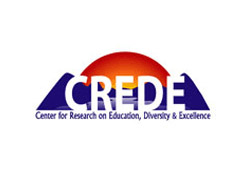Teachers and students are working together, on real products, real problems. Activities are rich in language, with teachers developing students’ capacity to speak, read, and write English and the special languages of mathematics, science, humanities, and art. They teach the curriculum through meaningful activities that relate to the students’ lives and experiences in their families and communities. Teachers challenge students to think in complex ways and to apply their learning to solving meaningful problems. Teachers and students converse; the basic teaching interaction is conversation, not lecture. A variety of activities are in progress simultaneously (individual work; teamwork; practice and rehearsal; mentoring in side-by-side, shoulder-to-shoulder, teacher-student work). Students have systematic opportunities to work with all other classmates. They all learn and demonstrate self-control and common values: hard work, rich learning, helpfulness to others, mutual respect (Tharp, Estrada, Dalton, & Yamauchi, 2000, p. 8).
These strategies are derived from Vygotsky’s theory and over 30-years of research from the national CREDE project, now at University of California, Berkeley. These standards were recognized by the national What Works Clearinghouse. For more information, go to http://crede.berkeley.edu.
For the past seven years, our program has offered professional development to teachers of native Hawaiian and other culturally and linguistically diverse students. We are currently working on developing an early childhood place-based science curriculum in collaboration with several schools across the state of Hawai‘i.


